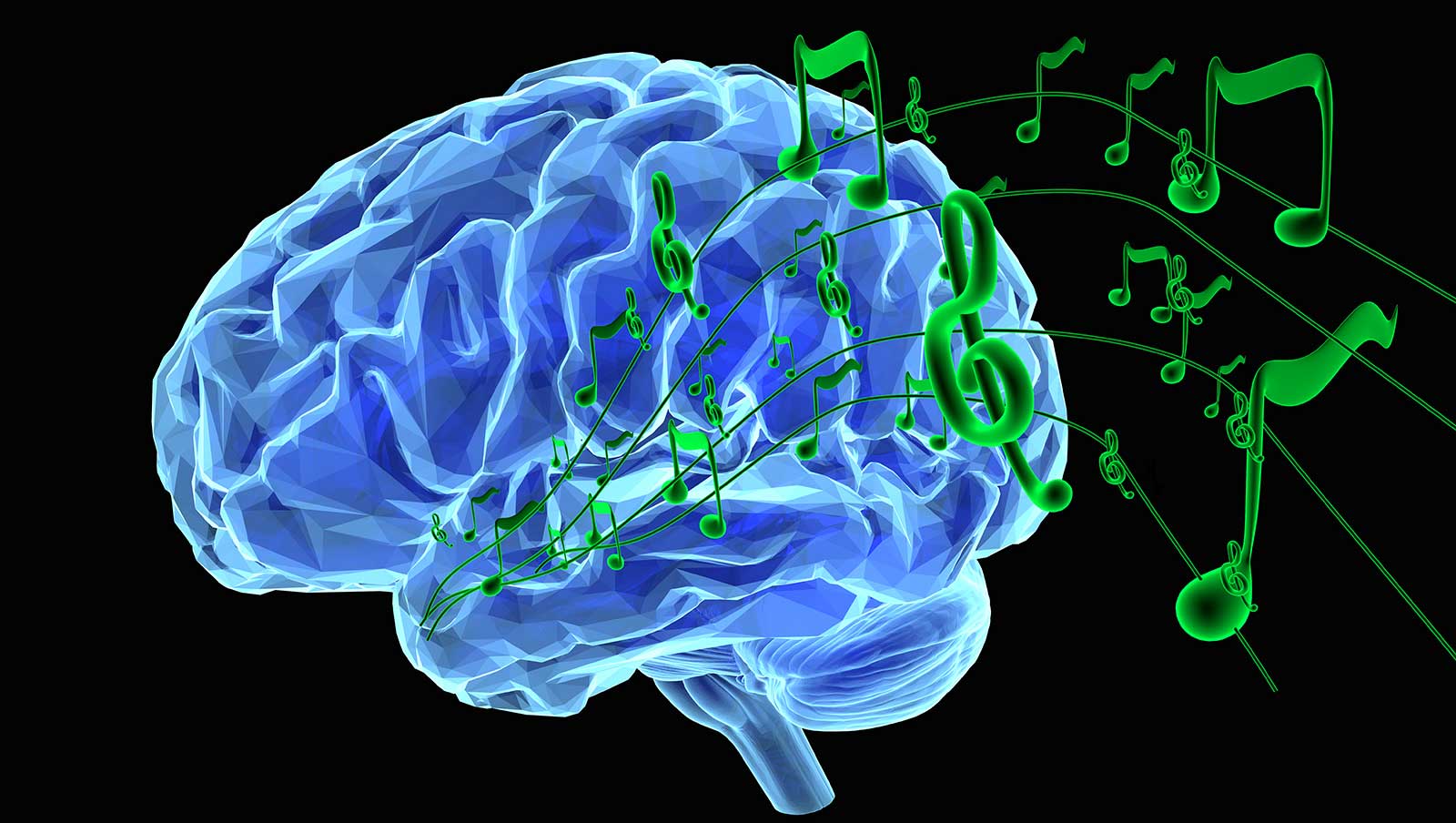Country, Western swing, free jazz, blues, house, noise, rock and roll, power pop, jazz rock, punk rock, ska, reggae, disco, jazz rap, etc. – on Today, 17 musical genres and several hundred subgenres are known, but despite such a variety, each of them has its own admirers.
To the question “What is the role of music in human life?” there are many answers. Today we invite you to familiarize yourself with a number of new scientific studies that shed light on another little-known aspect – the effect of music on the brain.

1. Can music make us happier?
According to the American music theorist Jerrold Levinson, musical language is no less expressive system of communication than ordinary human language as a subject of linguistics.
Since music carries a much more powerful emotional charge than real life events, modern psychologists are increasingly resorting to the use of music therapy. Its positive impact on the human condition can be explained at least by the fact that the reactions of our nervous system to cheerful and sentimental pieces of music are completely different. For example, participants in a recent experiment, after listening to a short song, interpreted a neutral facial expression as happy or sad, depending on which melody they heard.
Emotions that arose under the influence of music can be conditionally divided into two types – perceived and felt. This means that a person is able to understand the mood of a piece of music, even if he has never experienced such sensations in real life. So, with psychological disorders of a depressive nature, cheerful music only aggravates a person’s condition, while sad motives, on the contrary, bring back bright colors to life. 🙂
2. How does background noise affect creativity?
In order not to go crazy with boredom while working on some painfully familiar task – for which you, quite possibly, receive a solid financial reward – you put on your headphones, set the desired volume, select the desired playlist and press the “play” button , it is so? Be that as it may, when it comes to work that requires activation of the right hemisphere, loud music is unlikely to help.
As it turned out, the average noise level is a kind of catalyst for creativity. Complicating the process of information processing, background noise stimulates abstract thinking and sets the human brain to a creative working mode. That is why public places – cafes, summer playgrounds, embankments, parks, etc. – attract creative people so much.
At a high level of noise, the human brain is too overloaded, as it tries not only to abstract from all distractions, but also to process information as efficiently as possible.
Aha!-moment, or the science of generating great ideas
3. Is it possible to determine the character of a person, knowing his musical preferences?
The results of this study, conducted by scientists from Heriot-Watt University (HWU), proved for the first time that there is a certain relationship between a person’s preferred musical genres and their character.
In the first part of the experiment, 36,518 young people from all over the world were asked to rank 104 musical genres based on their personal preferences. The next stage of the study was somewhat more difficult: the participants had to break into pairs and try to determine the character traits of their partners, based on their list of the 10 most listened to songs. Five qualities were chosen for analysis: openness to new experience, extraversion, politeness, conscientiousness and emotional balance.
The scientists came to the following conclusions:
- blues fans are creative, sociable, polite and arrogant;
- among jazz lovers most often there are creative, friendly people with high self-esteem;
- fans of classical music belong to an introverted personality type, but despite this, they have a high sense of dignity and outstanding
- creative abilities;
- rap fans are sociable and slightly selfish;
- opera lovers include polite, open, creative personalities;
- country and western fans are distinguished by their diligence and ability to easily find a common language with others;
- reggae fans have high self-esteem, are creative and sociable, but diligence is definitely not about them;
- lovers of rhythmic dance music belong to an extroverted personality type, have certain creative abilities, but do not have good manners;
- indie fans have low self-esteem, they are not hardworking and often poorly educated;
- Bollywood fans (music from Indian films) are very responsive and friendly;
- very often fans of heavy music – heavy metal (heavy metal), hardcore, etc. – have low self-esteem, but they have great creative potential.
The results obtained allowed scientists to develop a unique model of its kind that reflects the relationship between musical preferences and human character:
4. Should I listen to music while driving?
There are countless hypotheses about the amazing power of the influence of music on the process of driving, but unfortunately, none of them gives an answer to the question of whether it is safe. The results of a recent study conducted by scientists from the Ben-Gurion University (Beer Sheva, Israel) cast doubt on the generally accepted assumptions about the positive effect of music on the behavior of drivers while driving.
Scientists have tested how drivers are affected by the music they choose on their own, the “safe” compositions proposed by the researchers, and the complete absence of any musical accompaniment. As a result, the assumptions made by scientists before the start of the experiment were fully confirmed: drivers made the most mistakes while driving accompanied by the songs they chose, slightly less dangerous situations arose in the absence of musical accompaniment, and the music proposed by the researchers had the most favorable effect on drivers.
5. Is there a connection between music and logic?
As you know, learning to play musical instruments at an early age has a positive effect on the further development of the child. In 2008, Marie Forgeard, Ellen Winner, and Andrea Norton, faculty members at the University of St. Andrews, found that children who have been playing music for about three years have outperformed their children. peers on four indicators at once: perception of information by ear, motor skills, vocabulary and logical thinking.
Thus, scientists came to the conclusion that long-term intensive musical practice has a positive effect not only on the interhemispheric organization of auditory and motor functions, but also on the process of redistribution of mental functions between the left and right hemispheres of the brain (lateralization).

6. How does classical music affect stroke victims?
A small study, the results of which were published on the website of the American Occupational Therapy Association, showed that classical music has some rehabilitative properties.
The experiment was carried out with the participation of 16 patients who had a stroke in the right hemisphere of the brain. Over the course of one week, the researchers observed how classical music, white noise, and silence affected the attention and visual perception of each patient. The results were recorded by scientists using specially designed visual analogue scales (VAS, usually used to determine the degree of pain intensity). As with creativity and driving, the silence did not live up to scientists’ expectations, but classical music significantly increased the patients’ attention span and improved their visual memory.
7. Why is it harmful to eavesdrop on telephone conversations? 😉
There is a sign on the Tokyo subway warning that telephone conversations disturb the peace of other passengers. As it turned out, there is a scientific explanation for this. 🙂
According to a study conducted by scientists at the University of California at San Diego (University of California, San Diego), if a person becomes an unwitting witness to such a “half-dialogue”, then his attention is scattered more than if he heard a full-fledged conversation.
“According to the results of a social survey, 82% of people find telephone conversations frankly annoying. We were curious to know what kind of mental influence passive listeners give in, since today each of us has to try on this role several times a day, ”says Veronica Galvan, head of the study, assistant professor of psychology.
During the experiment, 164 volunteers were asked to decipher several anagrams. At this time, the researchers themselves actively communicated with each other or talked on the phone, while the participants did not even suspect that the inappropriate behavior of psychologists was also part of the experiment.
Having finished the task, those students for whom the telephone conversation served as a background admitted that this significantly reduced their speed of work and concentration, while the other half of the participants remembered with grief in half what the scientists were talking about and whether they talked at all.
8. How to make training more productive?
Scientists have been studying the influence of music on the process of physical training for many years. For example, in 1911, American scientist Leonard Ayres found that cyclists pedal much faster when listening to rhythmic music than when they ride in silence.
This happens because the music simply drowns out signals of fatigue. The body, feeling physical exhaustion, sends appropriate impulses to the brain that the muscles need time to recuperate. Music, in turn, predetermines such signals and motivates a person to practice longer. It should be noted that musical accompaniment is especially useful during training at low or moderate intensity, since the pain that occurs during heavy exertion is almost impossible to ignore.
Musical accompaniment also helps a person to manage his energy reserve in the most effective way. A 2012 study found that cyclists who listen to music while exercising consume 7% less oxygen, despite the fact that the load remains the same.
